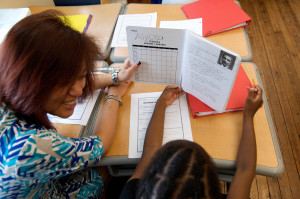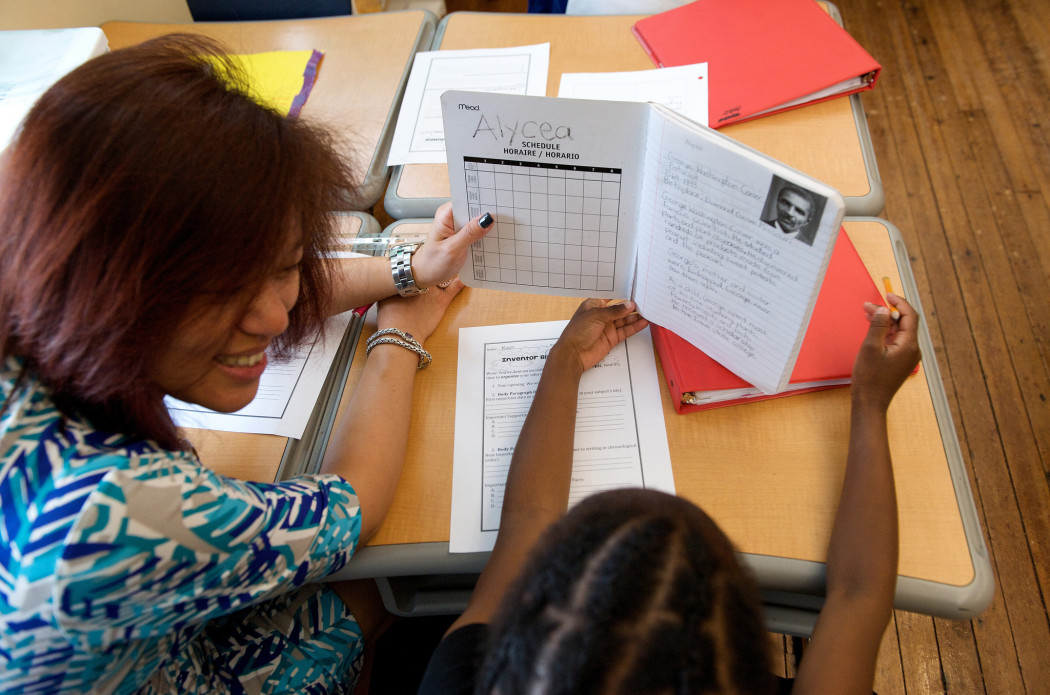>> Years ago, I was in a horrible parent-teacher meeting. One of my students failed my class and wasn’t going to graduate. The mother wanted me to change her child’s grade. I refused. As her son hunched in his chair, his mother pointed her finger at me, and told my supervisor, “She can’t understand. She’s not a mother.”
Years ago, I was in a horrible parent-teacher meeting. One of my students failed my class and wasn’t going to graduate. The mother wanted me to change her child’s grade. I refused. As her son hunched in his chair, his mother pointed her finger at me, and told my supervisor, “She can’t understand. She’s not a mother.”
And she was right. I didn’t have a primal need to protect my young surging through me. I was fighting for what was right, not to erase the hurt and humiliation my son was feeling, but I still felt awful and wondered how the situation would have been different if her advocacy had been better.
Over the last dozen years, I’ve met all kinds of parents and have had all sorts of feelings towards them and their children (overwhelmingly positive, by the way), but the essentials of good and effective advocacy remain the same.
Ask the teacher before you go to principal, crowd source on social media, or threaten to “take it to the board.” No one knows what happened in the classroom or why certain actions occurred better than the person in control of that room. A good principal will usually refer you back to the teacher anyway and trying to find the answer by asking people on Facebook is about as responsible as telling your child to engage in gossip by the monkey bars.
When you ask, ask politely. A “please” and “thank you” go a long way in putting a teacher at ease and teach your child that manners matter.
Ask your child too. I’ve received numerous emails wondering why Sarah isn’t trying harder or pondering why Jimmy didn’t turn in his homework. The only people who truly know the answer are Sarah and Jimmy, and if they are too young to know, or lack the self-awareness, sit down and try to puzzle it out with them. Ask the teacher for a conference, but make sure Sarah and Jimmy attend.
Be proactive — but don’t ambush the teacher early and often. I can almost guarantee that if you approach the teacher at Open House or Back to School Night to discuss what makes your child so unique, while 100 other parents are waiting to shake hands and do the same, the teacher won’t remember who you and your child are by the end of the night.
Being proactive means attending those meetings so you understand the goals and expectations for the year, introducing yourself to the teacher if you are so inclined, and then sending a follow up email the next day.
It means familiarizing yourself with the handbook, syllabus, and online gradebook. It means making sure you know when progress reports and report cards are supposed to come home. It means attending conferences.
It means not waiting until the end of a grading period (or worse, the end of the year!), before reaching out.
It means not expecting a teacher to notify you every time a homework assignment is missing or a low test score is earned (especially in high school), but asking your child to show you their work, or sending a teacher an email if you are concerned or would like an update.
Most of all, it means being proactive with your children. Teach them from a young age how to ask teachers for extra help and how to let adults know what they need or how they learn best.
Calm down. Almost any problem or misunderstanding that arises in the classroom can be solved easily, but not when tempers are high. And, besides, your child will observe how you feel about the teacher and mimic that behavior, often exacerbating the problem.
Time is rarely of the essence (especially if you were proactive) and most schools have a policy that states how long a teacher has to return a phone call or email. Treat teachers like the professionals they are and respect that they have a lot of responsibilities to take care of — responsibilities that are demanding the teacher’s help while they learn to read, write, solve an equation, master a new technique, etc.
You wouldn’t show up to your doctor’s office without an appointment and even the emergency room often makes you wait, so please do not show up before school, during a class, or during tutoring hours and demand to speak to the teacher. Set up a time where you and your child can receive the undivided attention you deserve.
Your children also know how to rile you, often to get what the reaction they want. Listen to what they say, take a breath, tell them to breathe, and after that breath (or ten), reach out to the teacher, who because she got into education to help the next generation, will be more than happy to help you.
>> Jennifer Brick is a writer and teacher in Durham, North Carolina. She earned her Masters of Fine Arts in Creative Nonfiction from Goucher College. Follow her on Twitter @jenbrickwrites.
Jennifer Brick is a writer and teacher in Durham, North Carolina. She earned her Masters of Fine Arts in Creative Nonfiction from Goucher College. Follow her on Twitter @jenbrickwrites.

There are no comments
Add yours